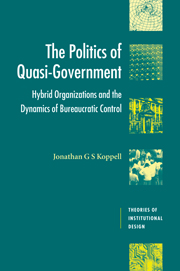Book contents
- Frontmatter
- Contents
- List of figures
- List of tables
- Acknowledgments
- List of acronyms
- 1 Introduction
- 2 Building a better model of bureaucratic control
- 3 Administration by regulation
- 4 Principal's preference, organizational structure and the likelihood of control
- 5 Hybrid organizations and the alignment of interests
- 6 The limits of congressional control: agent structure as constraint
- 7 Regulating hybrids: structure and control
- 8 Conclusion
- Appendix: background of organizations studied
- Interview subjects
- References
- Index
5 - Hybrid organizations and the alignment of interests
Published online by Cambridge University Press: 22 September 2009
- Frontmatter
- Contents
- List of figures
- List of tables
- Acknowledgments
- List of acronyms
- 1 Introduction
- 2 Building a better model of bureaucratic control
- 3 Administration by regulation
- 4 Principal's preference, organizational structure and the likelihood of control
- 5 Hybrid organizations and the alignment of interests
- 6 The limits of congressional control: agent structure as constraint
- 7 Regulating hybrids: structure and control
- 8 Conclusion
- Appendix: background of organizations studied
- Interview subjects
- References
- Index
Summary
Principals' control of bureaucratic agents is only a piece of the political puzzle. How does hybrid structure alter the political dynamics of the governmental process? Based on a detailed analysis of a legislative case study involving Fannie Mae and Freddie Mac, two answers to this question are presented in this chapter: (1) the characteristics that distinguish government-sponsored enterprises from traditional government agencies and private companies endow Fannie Mae and Freddie Mac with unique political resources; and (2) the alignment of interest groups around Fannie Mae and Freddie Mac creates opportunities for strategic manipulation. A triangular model of this alignment is proposed and employed to analyze the drafting and passage of the Federal Housing Enterprises Financial Safety and Soundness Act (FHEFSSA) of 1992.
This chapter is an important complement to the other sections of this book. It considers the consequences of hybrid structure during periods of extraordinary policy-making. Most research on bureaucratic control, including this book, focuses on the day-to-day interaction between principals and agents, referred to in these pages as ordinary policy-making. Extraordinary policy-making, large-scale legislative activity that reshapes institutions and occupies multiple players in the governmental process for extended periods of time, receives minimal attention. Although infrequent, such seminal moments of change in policy and/or organizational structure are, of course, crucial. They shape all subsequent ordinary policy-making interactions.
At the heart of this chapter is the FHEFSSA, a law that reshaped the regulatory infrastructure for two government-sponsored enterprises, Fannie Mae and Freddie Mac.
- Type
- Chapter
- Information
- The Politics of Quasi-GovernmentHybrid Organizations and the Dynamics of Bureaucratic Control, pp. 97 - 121Publisher: Cambridge University PressPrint publication year: 2003



